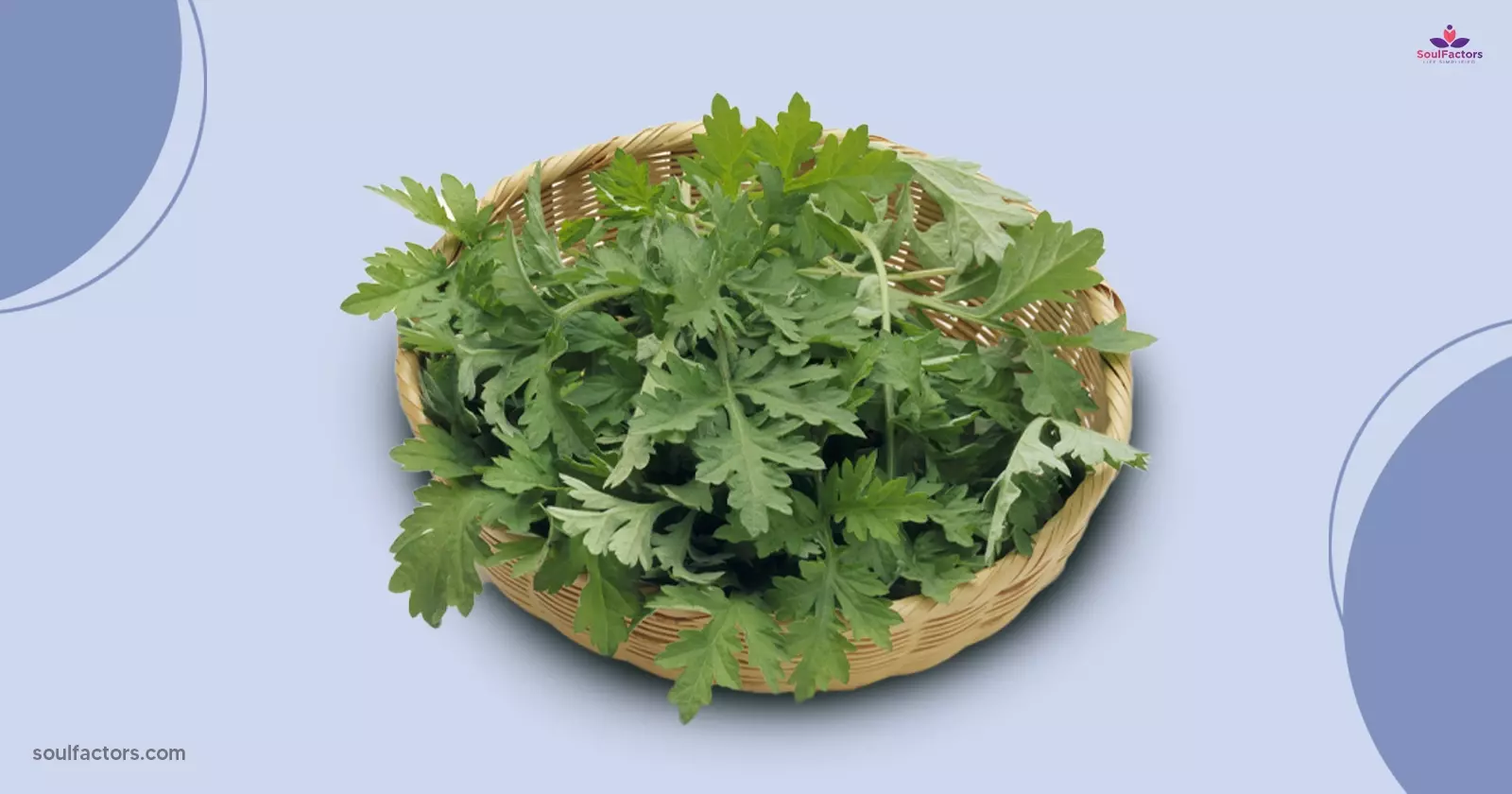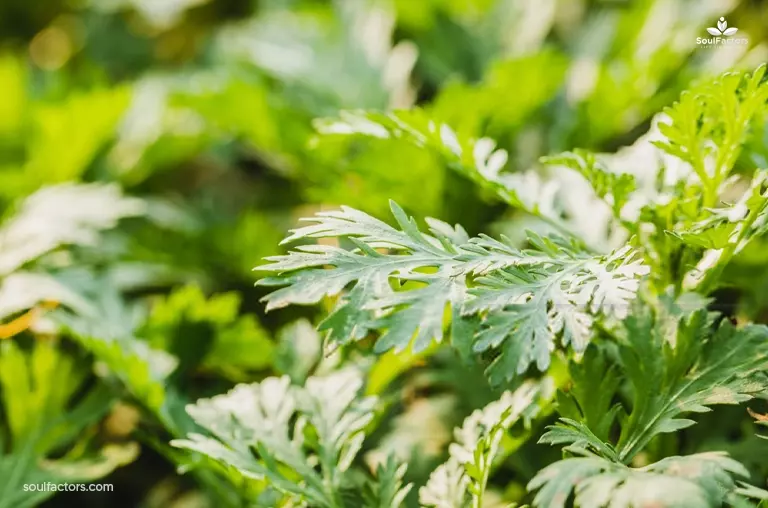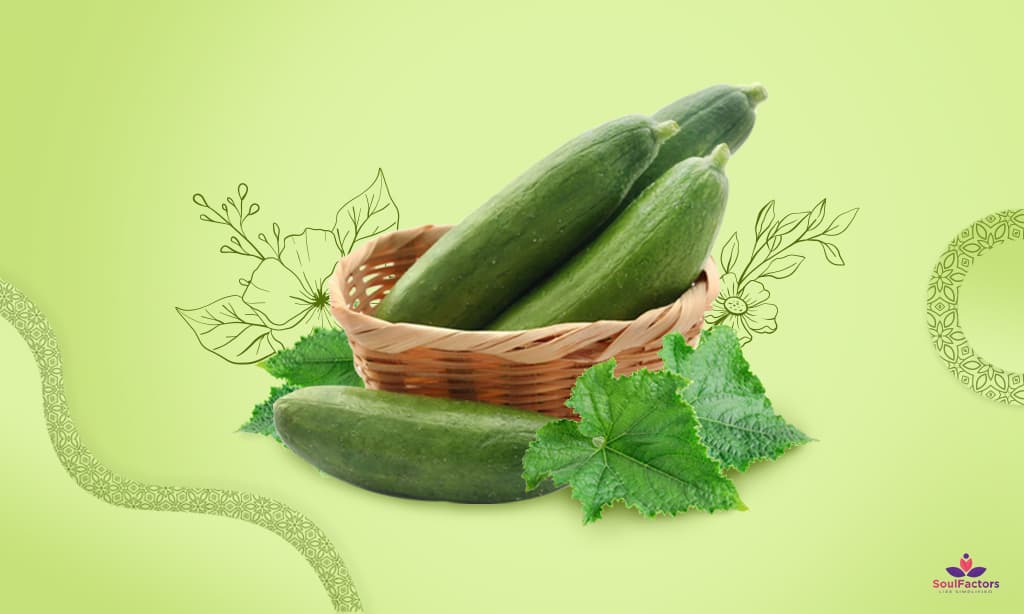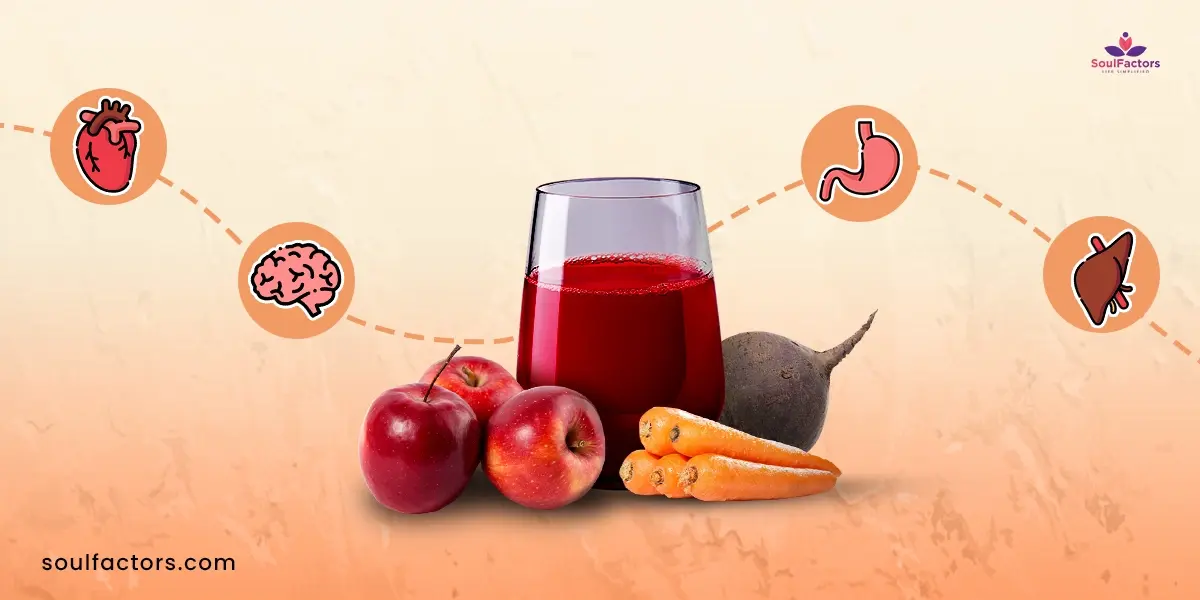Mugwort Benefits: Does Mugwort Really Work?
From skin health to menstrual health, there is so much that this herb claims. Between the puff and the science, where does the truth lie?
On Mar 22, 2023 – 12 minutes read

It is no exaggeration to call mugwort one of Nature’s marvels! Many different cultures hail Mugwort as a miracle plant. From being used in traditional medicines to being added as a spice to dishes and cooked and eaten like a vegetable, mugwort has quite a versatile history. Dry mugwort leaves are also smoked in a tobacco-like fashion owing to its psychoactive effects. As for its medicinal properties, mugwort benefits seem to have no end.
Here we discuss what we know about mugwort benefits, usage, risks, side effects, and more.
Mugwort Benefits: What Is Mugwort Really?
Mugwort is a medicinal plant that has been a key player in the traditional medicine systems of many countries for thousands of years. It is also referred to as ‘wormwood’ by some. Originally a perennial (long-living) herb native to Europe, Asia, and Africa, mugwort is now grown in many parts of the world including North America.
Both the leaves and the roots of mugwort are highly acclaimed for possessing medicinal properties and have found extensive usage in Chinese medicine. This wonder herb also has its place in the medicinal systems of other East Asian countries like Japan, Vietnam, Korea, and Mongolia.

It is most known for its role in the Chinese therapy practice of ‘Moxibustion’. Moxibustion is a peculiar treatment based on theories of Traditional Chinese Medicine (TCM). The process entails burning dried mugwort leaves on particular points on the body using acupuncture. The practitioner burns the leaves close to the individual’s skin surface using a stick to apply heat.
In Traditional Chinese Medicine, mugwort benefits have countless applications spanning multiple aspects of health, some of which are:
- Gastrointestinal
- Skin health
- Hair health
- Mental health
- Menstrual health
- Pregnancy/ Infertility
The list does not end there. There is more in a claim like Tuberculosis, asthma, hypertension, and breech births, among others.
But let’s first see what makes mugwort a cure-all.
What Are The Medicinal Properties Of Mugwort?
The main component in mugwort is ‘artemisinin’, which is known to have therapeutic effects. Studies(1) have found mugwort extracts to possess anti-inflammatory, antioxidant, and antimicrobial properties. Other studies also report their antifungal activity.
Let’s look at them in more detail:
Anti-inflammatory
Mugwort’s anti-inflammatory properties have been studied and established to a reasonable extent, suggesting their efficacy in the treatment of inflammatory(2) diseases like rheumatism, encephalitis, pneumonia, esophagitis, cancer, heart problems, and fibrosis. Moxibustion treatment is also beneficial for inflammatory skin conditions like eczema and psoriasis(3), an effect that has however been studied only in animals so far.

Antioxidant
Mugwort contains compounds such as polyphenols which have antioxidant and antimicrobial properties. Antioxidants are substances (like vitamins) that can protect your cells against free radicals which play a role in heart disease, cancer, and other diseases. Polyphenols on their own are known to improve lipid metabolism, insulin sensitivity, blood pressure, and cardiovascular health.
This suggests that mugwort’s antioxidant properties can be leveraged in the treatment of gastrointestinal diseases, type 2 diabetes, heart diseases, certain kinds of cancers, etc. This therefore gives some credibility to the anticancer claims for mugwort.
Antimicrobial
Different parts of mugwort have antibacterial, antifungal, and antiviral properties. A study on the essential oil made from mugwort leaves found that the compounds in the oil possess antifungal and antibacterial properties. This denotes potential mugwort oil benefits as a disinfectant and preservative against microorganisms.
Artemisinin, a derivative from mugwort, is a potent antiparasitic. It is therefore well established as a drug in the treatment of malaria and other parasitic infections such as schistosomiasis.
Mugwort Benefits For Health
Ever thought you would hear mugwort and Nobel Prize used in the same sentence? It is a little-known fact that the 2015 Nobel Prize in Medicine was awarded to a Chinese researcher for her discovery of artemisinin, a mugwort derivative. Professor Youyou Tu and her team proved that artemisinin from sweet wormwood could cure malaria thereby saving millions of lives in South China, Southeast Asia, Africa, and South America.
This discovery was a major breakthrough that sparked scientific interest and inspired subsequent studies in mugwort and other medicinal plants in alternative medicine. Most recently, studies(4) conducted on the efficacy of mugwort components in SARS-CoV-2 (Covid-19) indicate positive effects, adding to the prospect of mugwort usage in contemporary and future medical realms.
But mugwort benefits and its usage in general health date back to medieval times. What are the popular mugwort benefits of traditional medicine? What are the home remedies that involve the use of mugwort? Let’s take a look.
1. Digestion
Mugwort is a gut elixir! It is everything your gut needs, quite literally.
It acts as a digestion-enhancing medicine, a cure-all for gut issues. This plant can make your meal as a vegetable. Besides, it can be a flavorsome spice that can enhance the taste of your dishes. Putting it simply, mugwort is an all-rounder in the gut department.
In traditional Chinese, Indian, and European medicine, the mugwort species has been used to regulate the functioning of the gastrointestinal system. It is used to stimulate gastric juice and bile secretion which consequently aids in improved digestion.

Mugwort is ingested(1) to stimulate gastric secretions in patients with poor appetite. It is used against flatulence, distention, colic, diarrhea, constipation, cramps, and worm infestations.
In Asian countries, mugwort has been long used as a culinary herb in cooking and is still to this day used as an additive/spice in the food industry in various regions of the world. Mugwort leaves and tender stems are also eaten boiled or stir-fried, or in soups. A fact not surprising given its strong antioxidant and antimicrobial properties.
In today’s world, mugwort benefits can be leveraged for people with Irritable Bowel Syndrome (IBS) and GERD (Gastroesophageal reflux disease) or acid reflux to relieve symptoms and improve overall gut and intestinal health.
How to use mugwort for digestion: To reap mugwort benefits for digestion you can include this plant in your diet. Mugwort has a tart mint-like or juniper-like flavor. It is a popular seasoning for savoy cabbage, spinach, egg dishes, and vegetable soups in many Northern European cuisines. You can boil the leaves and stems to eat them or cook them to make different dishes. Also, adding dried mugwort leaves as a spice to soups and fries to give them a unique flavor is a more delectable option!
2. Mugwort Benefits: Mental Health
The benefits of mugwort extend to even your inner self!
Mugwort is an antidepressant, anti-anxiety drug, tranquilizer, memory booster, and even a mild psychedelic. It has been used since ancient times in the treatment of various mental ailments.
Mugwort is said to be a nootropic, that is a “smart drug” or a “cognitive enhancer”. It enhances mental abilities like memory and cognitive functions.
Mugwort has traditionally been used as a sedative in Chinese and European medicines. It acts as a sedative and is claimed by its proponents to improve sleep and fight fatigue. Possibly on account of this sedative effect, mugwort has also been used to treat anxiety and seizures, and to induce dreams. Dreams in traditional medicine are believed to be an essential part of healing. A mugwort flower essence is very effective for use as a dream inducer and as an energizer(5).

The root of mugwort is traditionally used as a tonic for psychoneuroses, neurasthenia, depression, autonomic neuroses, irritability, restlessness, insomnia, and anxiety. A study found that acupuncture and moxibustion have definite therapeutic effects on depression, with fewer adverse effects.
Mugwort plant also contains magnesium, potassium, and calcium phosphates which have a calming effect on the nervous system, pointing to further benefits of mugwort in the treatment of anxiety and depression. The use of mugwort for dreams, sleep, and anxiety has yet to be tested in clinical trials.
Related claims have been made such as that child affected by attention deficit hyperactivity disorder (ADHD) can benefit from mugwort therapy.
Mugwort is also used for recreation. Being a mental stimulant, some folks roll and smoke dry mugwort. It has a moderate psychotropic or psychoactive quality like that of weed.
3. Menstrual Health
Mugwort must be Mother Nature’s gift for women. It has a surprising variety of uses for women, especially in menstrual health.
The Chumash Indians of California as well as other major traditional systems of medicine have used mugwort to treat various common conditions related to hormonal imbalances in women. Menopausal symptoms, premenstrual syndrome, and dysmenorrhea are some of these. What could be the reason behind these woman-friendly mugwort benefits? Mugwort therapy is purportedly a safer option for menopausal women than hormone replacement therapy.
The artemisinin in mugwort causes gentle contractions of the uterus, thus promoting regular periods and relieving cramping. Certain compounds in the plant, known as α- and β- thujones, stimulate the muscles of the uterus and, when combined with eucalyptol, another constituent in mugwort, account for a variety of effects of Mugwort on the female reproductive system(6).

Eucalyptol in mugwort can act both as an analgesic and a sedative/ muscle relaxant. And α- thujones impart anesthetic effects. Both combined, makes Mugwort a powerful cure for menstrual cramping
Moxibustion was done on expectant mothers to avoid breech births (baby being born bottom first) and reduce the chances of a cesarean section, an effect supported by studies(7). Mugwort is burned over various acupuncture points of the woman. This assists the baby in repositioning itself to a head-down position prior to delivery, thereby avoiding the need for a riskier cesarean birth. Moxibustion is also said to release oxytocin, a hormone that regulates the uterus’s contraction during labor, thus working to ease the delivery.
However, it is not safe to be taken during pregnancy as it causes uterine contractions. It contains compounds that stimulate menstruation and kill fetal tissue. Mugwort can act as an abortifacient for this reason, harming umbilical cells in human fetuses.
4. Mugwort Benefits For Skin
Together with its antioxidant, antibacterial, and healing functions, mugwort may be able to give your skin new life.
Mugwort leaves are used to treat many skin conditions. It is considered to improve skin health due to its powerful antioxidant properties. Being a good anti-inflammatory agent, it has been found to be useful in the treatment of inflammatory skin conditions like eczema (atopic dermatitis) and psoriasis. It has proven effective in scientific tests conducted on psoriatic mice. However, more research is required to confirm this effect in humans definitively.

Mugwort for skin also promises effects like moisturization, improved complexion, and recovery from sun damage. Vitamin E is said to be the component in mugwort that helps the skin retain moisture. Mugwort can also relieve redness on the skin.
Mugwort is also a collagen stimulator that plumps the skin and helps reduce wrinkles and fine lines. It improves the skin’s barrier function, thus protecting your skin from harmful environmental aggressors.
With more studies supporting the effectiveness and potency of mugwort, it is now increasingly used in the production of cosmetics in Europe as well as in Asia and North America.
How to use mugwort benefits for healthier skin: The best way to use mugwort for your skin is to grab a mugwort-based skincare product from a store or the online market. Mugwort is a staple ingredient in many Korean beauty products. Mugwort powder washes are available, as are mugwort facial cleansers, face masks, creams, essences, and more. It will be a great addition to skin care for people with dry skin, sensitive skin, acne-prone skin, and aging skin. For anyone with any skin type, mugwort is therefore sure to act as a healer and beautifier.
5. Mugwort Benefits for Hair
Your genes may define your hair texture, but the secrets to healthy hair are hidden in many places in Nature.
Mugwort might be less known to the present generations as a hair care ingredient. It has however been widely used by Koreans in their traditional hair care system. Mugwort for hair is believed to give the strands a shiny look. Moreover, its antioxidant and antibacterial properties are said to promote a healthy scalp.
Extracts of Artemisia sieversiana, a species of mugwort, were found to promote papillary cell growth at the cellular level, to suppress expression of various enzymes involved in the hair cycle and cell death, and inhibit hair loss through anti-androgen, anti-inflammatory, and antioxidant effects.

Studies are scarce in relation to the benefits of common mugwort in hair health. But its proven composition of Vitamin E and other compounds that are known to promote hair growth pose mugwort as a potential remedy for many hair health concerns.
With the recent increase in the popularity of this herb, there is mugwort containing haircare products now available in the market. They are definitely worth a try for anyone looking for hair growth or a remedy for dry scalp.
6. Pregnancy
Mugwort is a body and mind healer in many ways, especially for women. So can women take it during pregnancy??
Mugwort, as we discussed earlier, is effective against menstrual cramps and lack of periods as it induces uterine contractions. This same function makes mugwort unsafe to be taken during pregnancy. Mugwort is therefore an abortifacient – something that can cause abortion of pregnancy. It contains these compounds that stimulate menstruation and kill fetal tissue. It acts to harm umbilical cells in human fetuses.

Some have made claims for the usefulness of the mugwort plant in enhancing fertility. Because its warming property is said to stimulate a cold uterus and help improve fertility. It is described as a uterine tonic that can strengthen and enliven the female reproductive system. However, this has not been studied or established scientifically.
What More Is There To Mugwort?
Mugwort has a special place in religious and spiritual ceremonies. It has a sweet and citrusy aroma that is believed to enhance psychic awareness and creativity. Mugwort as incense is used at homes and monasteries to purify the environment and aid in relaxation, stress relief, and meditation.
Mugwort smudge sticks are used similarly for their subtle, sweet scent and dream-inducing qualities.
Mugwort tea is also made and was taken to treat colds and fevers. People also use it in washes and salves to treat bruises, itching, sores, poison ivy, eczema, and body odor.
Are There Risks Or Side Effects To Taking Mugwort?
Yes! Natural doesn’t necessarily mean harmless.
Though mugwort is considered safe for most people, like any other herb or home remedy, there are things you should know before setting out to reap all of its infinite benefits.
Mugwort is related to ragweed. For people allergic to ragweed, it can cause a similar allergic reaction to that associated with ragweed. It can give rise to symptoms like sneezing and sinus-related symptoms, and contact dermatitis or rashes in some.
Mugwort can cause uterine contractions and lead to abortion in pregnant women. Pregnant women are therefore advised not to take mugwort. Its safety during breastfeeding is also not established.
Mugwort contains a substance called thujone, which can be toxic in large amounts. Though the amount present in the herb is not high enough to be unsafe for general use, it should be taken with caution.
One should also be aware of any interaction mugwort may have with other drugs one might be taking. It is always advised to make sure with your doctor that it is safe to be taken other medications.
There are many different species of mugwort that differ in their properties and benefits. It is important to know and understand what you need and to make sure that it is right and safe for you. So, make sure the mugwort comes from a trusted source or brand and seek expert advice if you are unsure.
Final Thoughts
Mugwort is a miracle healer that offers infinite possibilities. It has had varied applications in folk medicine for centuries in different cultures. Its antioxidant, antimicrobial, and anti-inflammatory properties have been studied and established. Mugwort, therefore, has great potential in treating gastrointestinal problems, menstrual problems, mental health issues, and skin diseases. With the right knowledge and necessary caution, we may explore and apply mugwort benefits to modern-day life.

Subscribe to Newsletter
Elevate your routine, stay on trend, and embrace a personalized beauty journey with our curated insights.





Write a Comment